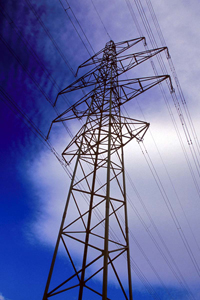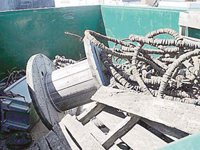Marine Debris Powers New England Town

Marine debris will help generate electricity — thanks to The N.H. Marine Debris-to-Energy Project located at the Yankee Fisherman's Cooperative in Seabrook, N.H.
This innovative project is a joint venture among the University of New Hampshire's Environmental Research Group, NH Sea Grant, UNH Cooperative Extension, and the nonprofit Blue Ocean Society for Marine Conservation, with funding from NOAA’s Marine Debris Grants program, and support from many commercial and recreational fishermen, cleanup volunteers, and educators.
Since April 2008, this dumpster has been collecting marine debris, abandoned fishing gear, and other items that can harm the marine ecosystem. What makes this dumpster unique is that when it's full, the debris is hauled away to a waste-to-energy plant where it is burned to make electricity. In fact, the first "pull" from the dumpster in Seabrook collected 1.34 tons of debris.
"The N.H. Marine Debris-to-Energy Project is a successful joint venture between public and private organizations that have recognized the need to reduce marine debris on the shore, underwater, and out in the ocean," said Jenna Jambeck, research assistant professor, Department of Civil/Environmental Engineering at UNH. "By identifying and monitoring marine debris, we can get a better understanding of what makes up ocean-based debris, develop plans to start a cleanup program, and help create a solution through education and outreach."
Major components of the project:
- Commercial and recreational fishermen will be actively involved in removing "derelict" fishing gear at sea.
- Gear can be placed in the donated Waste Management Dumpster at the Yankee Fisherman's Co-op, where it will be collected and hauled to a waste-to-energy facility and turned into electricity.
- Fishermen will have ready access to bins to recycle their monofilament fishing line.
- Cleanups along the New Hampshire coastline will expand, involving more volunteers and creating more aesthetically pleasing, healthier and safer beaches.

The project also will provide a collection point for data from beach cleanup volunteers, commercial and recreational fishermen, and other users of the coastline to report marine debris. Users of the Web site will be able to generate reports and maps to learn more about marine debris along the New Hampshire coast and in the Gulf of Maine.
"Marine debris is a hazard to water-craft navigation and can pose a threat to life and property when encountered at sea. In addition, protected marine species such as whales, dolphins, and sea turtles can get tangled in discarded fishing gear and other debris, which can result in injury or death,” said Ken LaValley, commercial fisheries specialist with the UNH Cooperative Extension Sea Grant.
To learn more about what you can do about marine debris, visit NOAA’s Marine Debris Program Web site. For more information about The N.H. Marine Debris-to-Energy Project, visit the Project’s Web site. ![]()







